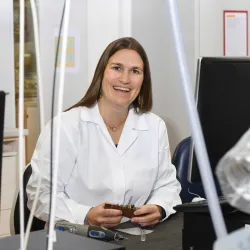E&E Seminar Series: Did meat make us human? Reconstructing the onset and evolution of early hominin meat consumption
Dietary shifts—particularly the inclusion of animal resources—were pivotal in human evolution, yet direct evidence of meat consumption in early hominins remains limited and debated.
Speakers
Event series
Content navigation
Description
ABSTRACT
Dietary shifts—particularly the inclusion of animal resources—were pivotal in human evolution, yet direct evidence of meat consumption in early hominins remains limited and debated. While nitrogen isotopes in bone and dentin collagen are powerful indicators of trophic level, they rarely preserve in fossils older than a few tens of thousands of years, making them an inaccessible proxy for studying hominins from millions of years ago. Tooth enamel, by contrast, is highly resistant to diagenesis but contains too little organic material for conventional nitrogen analysis.
To overcome this, we developed a novel biogeochemical method to measure nitrogen isotopes from mineral-bound organics in fossil tooth enamel. Validated in modern and experimental settings, this approach reliably reflects trophic level.
I will present nitrogen and stable carbon isotope data from Plio-Pleistocene fauna at Sterkfontein Caves (South Africa), including the first nitrogen isotope results from an early hominin. These findings offer unprecedented insights into early hominin diets and enable us, for the first time, to place Australopithecus within its ecological food web, taking a crucial step toward understanding how meat consumption (or its absence) shaped the biological and behavioral evolution that ultimately made us human.
BIOGRAPHY

Since 2021, Tina Lüdecke leads the Emmy Noether Research Group “Hominin Meat Consumption” at the Max Planck Institute for Chemistry in Mainz, Germany. She is also an Honorary Research Fellow at the Evolutionary Studies Institute and the School of Geosciences at the University of the Witwatersrand in Johannesburg, South Africa (since 2022), and a Research Associate at the School of Anthropology and Museum Ethnography at the University of Oxford, UK (since 2017). Prior to this, Tina held postdoctoral positions at the Max Planck Institute for Chemistry (2021), the Senckenberg Biodiversity and Climate Research Centre in Frankfurt (2018–2020), and the College of Dentistry at New York University (2017–2018). She completed my PhD in Geochemistry at the Senckenberg Museum and Goethe University Frankfurt (2011–2016), which included a visiting research stay at Stanford University in 2013. Tina holds a Master’s degree in Geochemistry from the University of Hannover (2004–2010).
Location
Please note: this seminar will be held in the Eucalyptus Seminar Room and via Zoom, details are included below.
Eucalyptus Seminar Room, S205,
Level 2, RN Robertson Bldg (46)
Please click the link below to join the webinar:
https://anu.zoom.us/j/84815580207?pwd=NwuJk32VZbrzy8pliCrTPxbPAbjNXA.1
Webinar ID: 848 1558 0207
Passcode: 004728
Canberra time: please check your local time & date if you are watching from elsewhere.

